IT USED TO BE A MISS;
NOW, THE HEAT IS ON IN SAIGON
Infinitely stronger than the original Broadway outing, this national tour of Miss Saigon overcomes a still strangely muddled plot, some awkward sophomoric lyrics by Richard Maltby, Jr. and Alain Boublil, and a few scenes and songs that could be cut with no one noticing. What sticks is Claude-Michel Schönberg’s gorgeous score, which is sung-through like his Les Misérables (there are even some familiar strains from that blockbuster during Miss Saigon’s recitatives). The 1991 show – now tighter and still with that awesome helicopter scene — is based on Madame Butterfly, so the music is rightly influenced by Puccini, and then filtered through idioms of pop and musical theater. The lush score, whatever its manipulations or machinations, is quite lovely, aided by Will Curry leading a 12-piece orchestra.
This 42-member cast is hands down the most beautifully sung one I’ve seen. While the voices are clear and distinctive — a difficult feat in the numbers where the chorus backs up the leads with intricate harmonies — the sound at The Hollywood Pantages is shameful. Shameful. That this theater hasn’t found a way to have us hear each and every lyric is a crime against patrons. To be fair, the sound for tours is tough at many theaters across the land. (It sure wouldn’t hurt to lower the orchestra’s volume.)
As Chris, the burned out soldier who finds love just as Saigon is about to fall in 1975, Anthony Festa has a lovely voice, and he doesn’t succumb to the urge of so many before him to make everything sound like a power ballad (quite a feat considering all of the power ballads with long-held notes that there are in this show). He has power, yes, but it is tempered by a delicacy in the upper register and a control that gives the songs room to breathe. He doesn’t push. So his sorrow feels real, his bafflement at falling in love, genuine.
Kim is the seventeen year-old girl he falls in love with, newly arrived and coerced into prostitution at Dreamland, a Saigon bar that caters to soldiers on leave; every night there is a contest to crown “Miss Saigon,” after which a raffle-winner gets her for free. Emily Bautista sings the role with grace and intelligence, a babe in the woods who must learn to survive as the story progresses. By the end, Bautista isn’t a girl thrown to the lions; she’s a protective and determined woman who might just catch one of those lions and make a coat out of it.
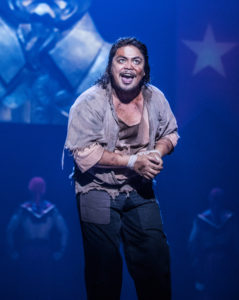 Then there is Red Concepción as the Engineer, the sleazy owner of Dreamland, who becomes a vital part of Kim’s story as she seeks some way of reuniting with Chris. He is always sweaty, on the make, boldly icky, and absolutely wonderful as he unctuously slinks across the stage. There’s something about his grasping, buoyant, idiosyncratic physicality that actually has you rooting for him … a few times. The Asian Concepción (who is Filipino) looks genuinely desperate for a visa to get into America; a far cry from the Tony-winning performance by Jonathan Pryce that stirred so much controversy in its day — with Pryce there was never that pushy sense of desperation, especially since Pryce is a Caucasian Welshman who’s about six feet tall. (He wants to come to the USA? Fly into LAX. No one would give him a second look.) With Concepción, who flaunts himself as if he were auditioning for RuPaul’s Drag Race, it’s fairly clear that this two-faced slimeball isn’t a likely candidate to flee the country — get in line with the other three million displaced people.
Then there is Red Concepción as the Engineer, the sleazy owner of Dreamland, who becomes a vital part of Kim’s story as she seeks some way of reuniting with Chris. He is always sweaty, on the make, boldly icky, and absolutely wonderful as he unctuously slinks across the stage. There’s something about his grasping, buoyant, idiosyncratic physicality that actually has you rooting for him … a few times. The Asian Concepción (who is Filipino) looks genuinely desperate for a visa to get into America; a far cry from the Tony-winning performance by Jonathan Pryce that stirred so much controversy in its day — with Pryce there was never that pushy sense of desperation, especially since Pryce is a Caucasian Welshman who’s about six feet tall. (He wants to come to the USA? Fly into LAX. No one would give him a second look.) With Concepción, who flaunts himself as if he were auditioning for RuPaul’s Drag Race, it’s fairly clear that this two-faced slimeball isn’t a likely candidate to flee the country — get in line with the other three million displaced people.
In general, the ensemble is best in moments of stillness. In the ceremony that Kim counts as her wedding to Chris, the women’s voices are meltingly beautiful in their perfect blend, and the men’s voices rapturously soar in “Bui-Doi,” the number most blatantly calculated to bring you to tears. “Bui-Doi” is sung by Chris’s friend John 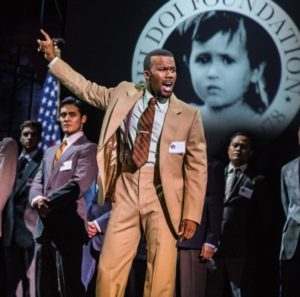 (the pile-driving J. Daughtry) about the terrible plight of the mixed race offspring of white servicemen and Vietnamese women who have been left behind after the war, which is central to Chris and Kim’s story.
(the pile-driving J. Daughtry) about the terrible plight of the mixed race offspring of white servicemen and Vietnamese women who have been left behind after the war, which is central to Chris and Kim’s story.
Bob Avian’s choreography (with Geoffrey Garratt) has the quasi-gymnastic-martial arts tumbling in “The Morning of the Dragon” thoroughly exciting. Noah Gouldsmith, McKinley Knuckle, and Kevin Murakami enthrall even as you may be thinking, “Are those hunky white boys doing a dance celebrating the unitary socialist government reunification of Vietnam?” (Well, two of ’em are white anyway…) And in the Engineer’s big number “The American Dream,” the chorus adds to the energy of Concepción’s gleeful ferocity.
An exciting Christine Bunuan brings ferocity to the rather thankless role of Gigi, the winner of the “Miss Saigon” pageant at Dreamland on Kim’s first night, who sings the first half of the poignant “The Movie in My Mind” which sort of echoes Fantine’s big number in Les Miz (I have always thought of the number as “I Dream a Dream in Nam”). Then the character fades back into the chorus, which is a shame, as you’ll want to see more of Bunuan.
Frankly, the role of Ellen, Chris’s new American wife, has always been a downer. The plot’s momentum hinges on Ellen. Between the end of the war and Chris and Kim’s reunion three years later, Chris has returned to San Francisco; unable to find Kim in the chaos of Saigon’s transition to Ho Chi Minh City, he gives up and finds love with Ellen. But his nightmares of the war and of Kim’s possible outcome stay with him. Ellen’s original song “It’s Her or Me” was later tempered with “Now That I’ve Seen Her.” Now, it’s some kind of pseudo-torch song, “Maybe,” which is pretty much the same three-note pattern over and over again (additional lyrics by Michael Mahler). Would someone please write this character an eleven o’clock number, since that’s practically what time it happens anyway? At least Stacie Bono offers impressive vocals and grand sincerity, elevating the role to a point where we are on both Ellen and Kim’s side, just as it should be.
Under Laurence Connor’s vigorous direction, the production’s technical elements are astounding by any measure, but especially impressive given that this is a very large tour — about five buses and six trucks. Thus, the Engineer still has his pink Cadillac with the looming grotesque face of the Liberty Statue behind him in “The American Dream.” When he joyfully humps the hood of the car it strikes you as a kind of metaphor for the entire mess of the Vietnam War. Plus, it’s awfully engaging, as is this production of Miss Saigon. Whatever the show’s flaws, it’s definitely worth a look, and just as impressively, a listen. If only it weren’t for that damned sound problem…
photos by Matthew Murphy
Miss Saigon
U.S. Tour reviewed at Hollywood Pantages, July 19, 2019
departs L.A. August 11, 2019
tour continues well into 2020
for dates and cities, visit Miss Saigon
article written with Samuel Garza Bernstein
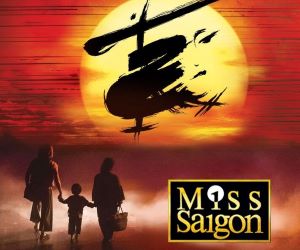
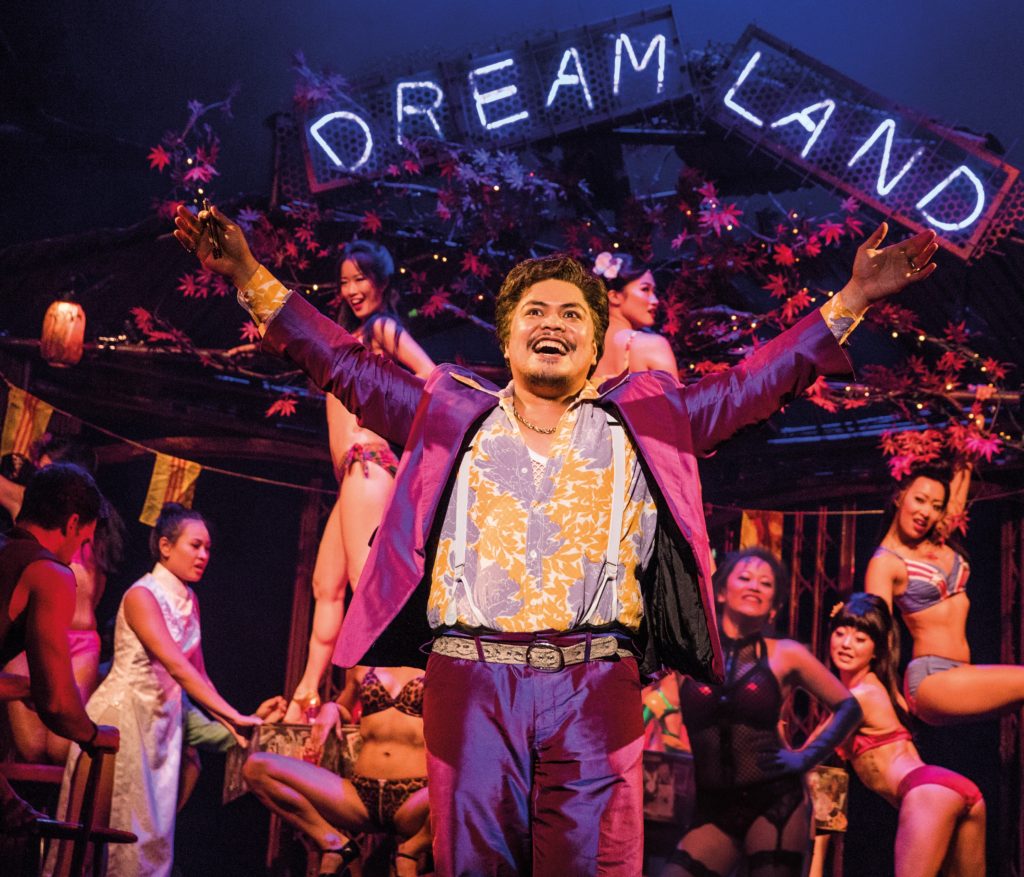
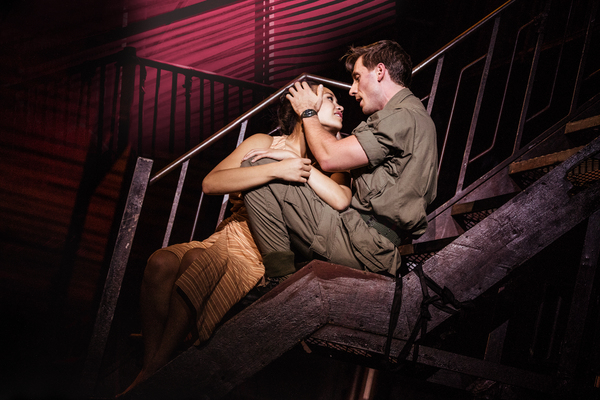
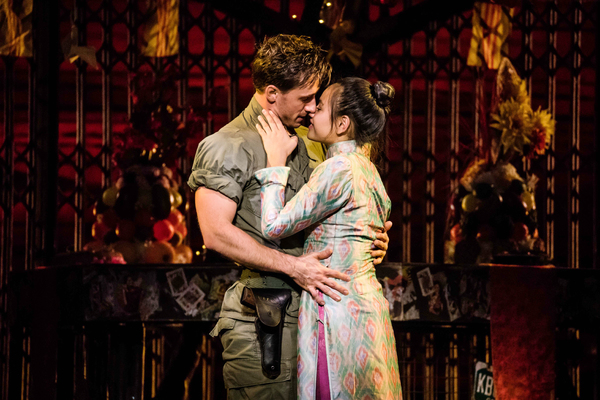
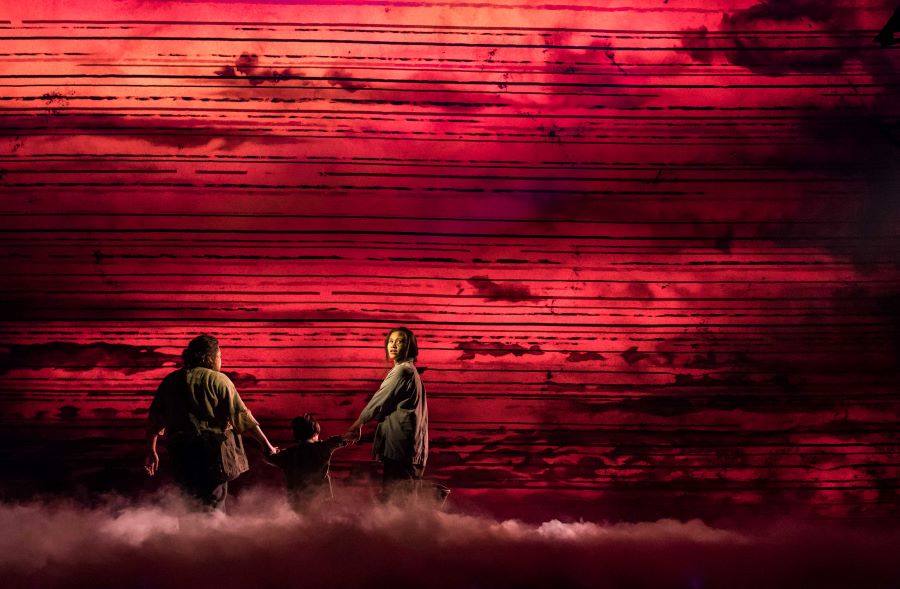
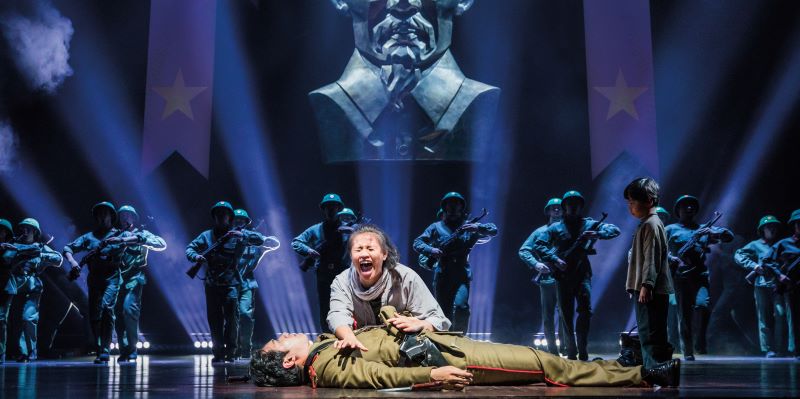
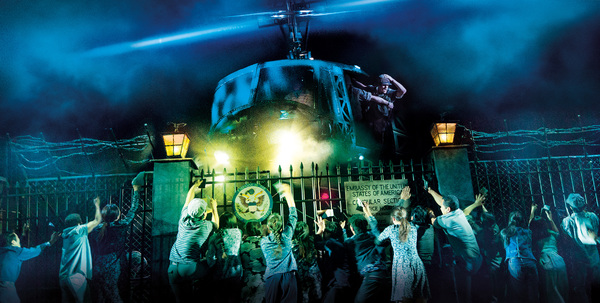

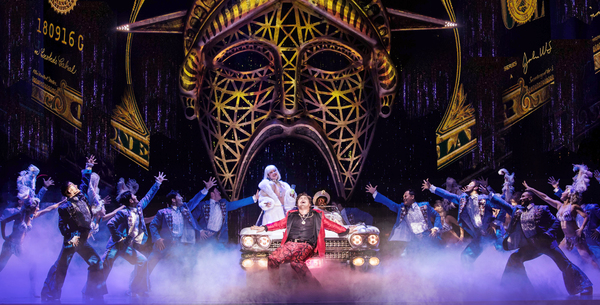

{ 1 comment… read it below or add one }
Dear Mr. Frankel:
Thanks for your informative and descriptive review. I’ve already purchased my tickets and am looking forward to seeing this Miss. I caught the Broadway revival (then starring the vocally ravishing Eva Noblezada who currently stars in Hadestown) and hoped the tour would capture the Broadway cast’s unbridled energy. As per your review, I believe they have. How wonderful! So glad this Miss Saigon is smarter and vigorous, and not (as Forbidden Broadway composer Gerard Alessandrini called the original production), “Viet Numb”. Ever your devoted reader.